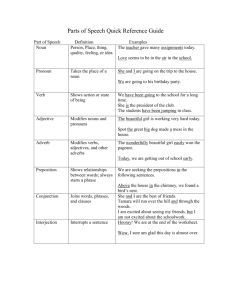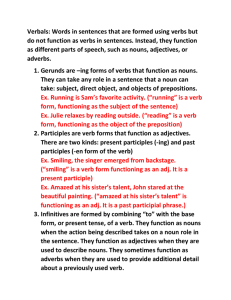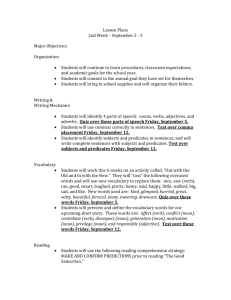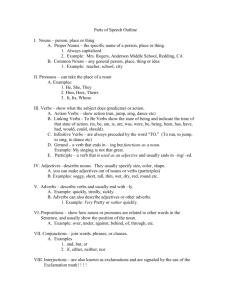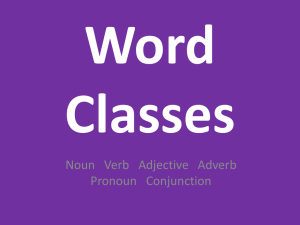NOUNS – name persons, places, things, or ideas
advertisement
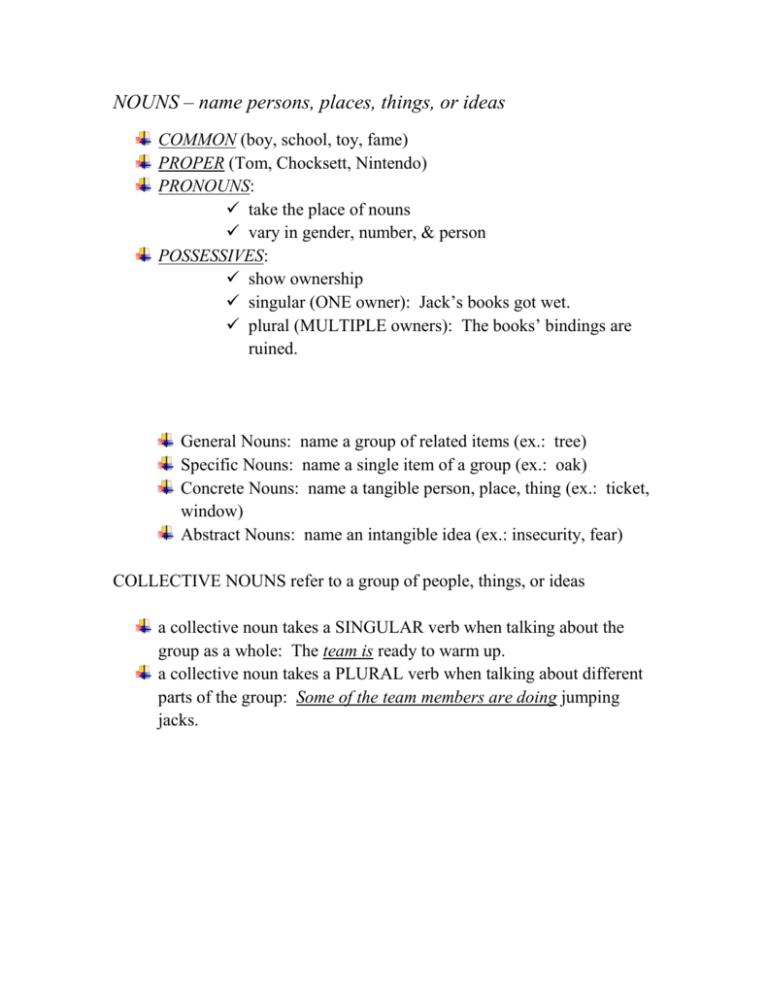
NOUNS – name persons, places, things, or ideas COMMON (boy, school, toy, fame) PROPER (Tom, Chocksett, Nintendo) PRONOUNS: take the place of nouns vary in gender, number, & person POSSESSIVES: show ownership singular (ONE owner): Jack’s books got wet. plural (MULTIPLE owners): The books’ bindings are ruined. General Nouns: name a group of related items (ex.: tree) Specific Nouns: name a single item of a group (ex.: oak) Concrete Nouns: name a tangible person, place, thing (ex.: ticket, window) Abstract Nouns: name an intangible idea (ex.: insecurity, fear) COLLECTIVE NOUNS refer to a group of people, things, or ideas a collective noun takes a SINGULAR verb when talking about the group as a whole: The team is ready to warm up. a collective noun takes a PLURAL verb when talking about different parts of the group: Some of the team members are doing jumping jacks. Forming Possessive Nouns: To form possessive of: Add Examples a singular noun 's girl's aunt James's smile (or James’ smile) a plural noun ending in s ' vases' colors boys' hats a plural noun not ending in s 's women's creations moose's hoofs Gerund = a noun formed by a verb. If you want to use an action word in a place that requires a noun, you can usually use a verb with an -ing ending. Fishing is fun. Hiking is difficult. That is ballet dancing. Fishing, hiking, and dancing look like verbs, but they are nouns called GERUNDS (when a noun looks like a verb with –ing). Types of Sentences (by type) Sentences may be classified according to purpose 1. 2. 3. 4. Declarative sentences make a statement (.) Interrogative sentences ask a question (?) Imperative sentences make a command or request (.!) Exclamatory sentences show strong emotion (!) Types of Sentences (by structure) Sentences may be classified according to structure 1. Simple sentence = one independent clause without transitional words or dependent clauses (ex.) Wendy has a red wagon. 2. Compound sentence = 2 or more simple sentences joined by a coordinating conjuction (ex.) The train chugged down the track and then it pulled to a stop at the station. 3. Complex sentence = simple sentence + dependent clause (ex.) Andre slammed the door shut before running out to play. 4. Compound-Complex sentence = compound sentence (2 simple sentences) + dependent clause (ex.) When the scene was over, the actor got out of the car and he returned to the trailer. VERBS: express time show an action, a condition, or the fact that something exists Types: action: indicates action of a person or thing run, ski, fly, dance… linking: connects the subject of a sentence with a noun or pronoun that renames or describes the subject Always linking verbs: Forms of be: am, is, are, was, were, has been, are being, might have been, etc., and become, and seem Can be linking verbs: appear, feel, grow, look, prove, remain, smell, sound, taste, and turn helping: can be added to another verb to make a single verb phrase may, might, must, be, being, been, am, are, is was, were, do does, did, should, could, would, have, had, has, will, can, shall Helping + Action = He can run very quickly. Helping + Linking = He can become very tired. A verb has 4 PRINCIPAL PARTS: (ex.) regular (ex.) irregular present present participle going past past participle gone walk am walking go am walked have walked went have A VERB TENSE tells whether the time of an action or condition is in the past, present, or future 6 TENSES: present - shows actions that are happening now past - shows actions that have already happened future - shows actions that will happen present perfect - shows actions that begin in the past and continue into the present EX.: I have seen that movie many times. [present perfect progressive (continuous) EX.: I have been speaking all night.] past perfect - shows a past action or condition that ended before another past action EX.: I had never seen the beach before I moved to the coast. future perfect - shows a future action or condition that will have ended before another begins; it refers to the past in the future! EX.: I will have forgotten what I studied by then. ACTION verbs can be transitive: needs a direct object I hit the ball. I raised the flag. intransitive: doesn’t take a direct object I smiled at Sam. I rose from the chair. ADJECTIVES - describe (or modify) nouns & pronouns - may precede the noun: a happy camper - may follow a linking verb: she was hungry the cake smells delicious - answers one of the following questions: o what kind? The enormous watermelon was very juicy. o how many? The six children played with many different toys. o which one? These green apples make that boy sick. Degrees of Adjectives: o comparative – compare two nouns add –er (taller, quicker) add more/less (more confusing) o superlative – compare three or more nouns add –est (tallest, quickest) add most/least (most confusing) Proper Adjectives are formed from proper nouns: Canadian, Australian… Collective Adjectives: When the definite article, the, is combined with an adjective describing a class or group of people, the resulting phrase can act as a noun: the poor, the rich, the oppressed, the homeless… Adjective Clause - When a group of words containing a subject and verb acts as an adjective: My sister, who is older than I am, is an engineer. Adjective Phrase - When an adjective clause is stripped of its subject and verb: He is the one (who is) keeping my family in the poorhouse. ADVERBS – modify verbs, adjectives, & other adverbs When modifying VERBS, adverbs answer these questions: - how? -- carefully - where? -- there - when? – yesterday When modifying ADJECTIVES & ADVERBS, adverbs answer the question: - to what extent? – really, very EX: I drove my very ugly car really carefully. - very modifies the adjective ugly - really modifies the adverb carefully - carefully modifies the verb drove Degrees of Adverbs: - comparative – compares how two things were done add –er (faster, sooner) add more/less (more quickly) - superlative – compares how three or more things were done add –est (fastest, soonest) add most/least (most quickly) Adverbial Clause - a group of words that describes an action and contains a subject & verb: (ex) When this class if over, we’re going to the movies. Adverbial Phrase – when an adverbial clause is stripped of its subject & verb (ex) She ran next door. Both Adverbial Clauses & Phrases describe: how an action was done when an action was done where an action was done why an action was done Adverbs often function as intensifiers, which can emphasize: (ex.)He literally wrecked his mother's car. amplify: (ex.)The teacher completely rejected her proposal. downtone: (ex.)Matt kind of likes this college. Prepositions: show the relationship of one noun to another noun in a sentence (they can indicate position) (ex.) Teddy sat behind the desk. Teddy sat on the desk. Teddy refused to sit in the desk. - The noun following the preposition is called the object of the preposition - Words that modify the object of the preposition may come between the preposition and the object - Together, the preposition + the object of the preposition + modifiers of the object = prepositional phrase (ex.) Teddy refused to sit in the dirty, old, smelly desk!


